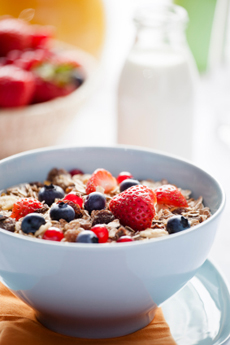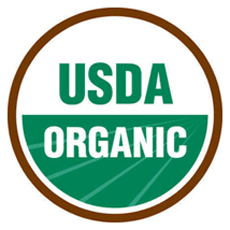

Granola and berries: a colorful and healthy breakfast. Photo by GM Vozd |
IST.
|
STEPHANIE ZONIS is a contributing editor.
|
|
January 2012
|
 |
Page 3: Types Of Granola Cereal
Read The Labels: There’s Something For Everyone
This is Page 3 of a seven-page-plus article on granola cereal, and reviews of 44 granola cereal brands and nine muesli brands. Click on the black links below to visit other pages.
Trends, Terminology, and Trash Talk
It’s easy to spot the buzzwords that are important to consumers these days (or at least those that the manufacturers deem important).
Artisan/Handmade/Made in Small Batches Granola
These terms have no legal definitions. These are mere marketing tools, meant to convey images of caring craftspeople producing granola and muesli with forethought, honest labor and love. The heck of it is that there are granolas and mueslis made this way, but they’re annexed by industrial-scale manufacturers. You need to be the judge: Is the product made by Mom and Pop or by a $200 million division of a billion-dollar corporation?
Gluten-Free Granola
A great number of granolas advertise that they’re gluten-free. A small number carry a gluten-free certification logo. If you have a serious gluten intolerance, you may need to search for products with the latter.
Natural/All Natural
As of this writing, there are no standards in the U.S. for the words “natural” or “all natural” (at least as far as most foods are concerned; there are some minimal requirements for meat). Anybody can tell you that their products are “all natural,” and it doesn’t mean a thing, even if their intentions are good. Continue here for an in-depth discussion of “natural.”
No Cholesterol/No Trans Fat/No Saturated Fat Granola
These understandably popular tags are used on many products.
Non-GMO Granola
In my opinion, not enough manufacturers are concerned about GMOs, genetically-modified organisms. A handful of granola/muesli producers include some non-GMO ingredients, which is a start, but only the Go Raw brand claims that none of its ingredients is genetically modified.
Nut-Free/Dairy-Free/Wheat-Free Granola
With a bumper crop of nut and peanut* sensitivities in the U.S., some producers of granolas and mueslis have added nut-free variations to their rosters (or are manufacturing their entire lines nut free).
- Lactose-free granolas: Given those who choose not to consume dairy these days (or can’t), some manufacturers are quick to let you know their products are free of dairy. If you find the latter odd for granola/muesli, be aware that several products reviewed in this article as “favorites” are granolas that contain butter, and I’ve run across one or two that include dried milk as an ingredient.
- Wheat-free granolas and mueslis might be welcome to those with gluten intolerances, but bear in mind that “wheat free” does not necessarily equate to “gluten free.” One benefit of all the food sensitivities/allergies so prevalent today is that almost all manufacturers let you know if their products are made in kitchens where nuts, dairy products, soy products, eggs, and/or other common allergens are used.
*Botanically, peanuts are legumes, not nuts.
Organic Granola
Organic granola is certified organic by the U.S. Department of Agriculture, after meeting a list of stringent reguirements. The package will bear the USDA organic seal. There are different levels of certification, from 100% Organic to Made With Organic Ingredients, where 70% of the ingredients must be certified organic. Here’s more information about the levels of, and requirements for, organic certification.
|
|
 |
“Raw” Granola
Remember that there is no legal definition of a “raw” food. There’s no independent, third-party certification for “raw” products. There’s no agreement, even within the raw food community, about the maximum permissible temperature for food during processing (EDITOR’S NOTE: The most commonly acceptable is 118°F).
So if you consume a “raw” granola or muesli, you’re going to have to take a good deal on faith. Having noted this, there are a handful or so of companies producing “raw” granolas. Most use sprouted, dehydrated buckwheat as a base for their granolas.
Sugar-Free/No Refined Sugar/No Agave
A current dietary villain, refined sugar has been omitted from any number of granolas and mueslis. This doesn’t necessarily mean that their sugar content is any less, though; unrefined or less refined sugars (and sweetness) can come in the form of agave nectar, brown rice syrup, brown sugar, honey, maple syrup, molasses, or a combination of those. The “No Agave” label I only saw on the granolas from Go Raw, but it’s a clever move on the part of raw food producers, as there is debate regarding whether it’s possible or commercially viable to produce an agave nectar at temperatures under 105° F. (Go Raw states that all of their processing takes place under that temperature). See our Sugar Glossary for more information on the different types of sweeteners.
Vegetarian/Vegan Granola
A significant percentage of the granolas/mueslis I tried make some mention of being vegetarian- or vegan-friendly. A few granolas I tried contained butter or nonfat dry milk powder, which would make them unsuitable for vegans.
Whole Grain Granola
Lots of producers have jumped on the “whole grain” bandwagon, and small wonder when the benefits of consuming whole grains have been so widely discussed. Adults should eat at least 48 grams of whole grains per day, but most manufacturers labeling their granolas/mueslis as “whole grain” don’t tell you how many grams of whole grains their product contains per serving.
Where To Begin?
With all these variations, and with the huge number of granolas on the market, how do you choose among them? You choose based on what’s important to you and what tastes good. Recognize that you likely won’t get everything your heart could desire in one food product, and go from there.
- If there are certain ingredients you want to avoid* (or, conversely, get more of in your diet), check a product’s website; if you don’t see the information you need, ask!
- If you follow a certain type of diet, go with the product(s) that follow it most closely. Do your research.
- Try products from some small-scale manufacturers. You don’t see many (if any) of their products in stores, but they’re easy to order online, and some make granolas/mueslis very much worth eating.
*For example, I know someone whose system cannot handle cinnamon, a common ingredient in granolas. By contrast, you might be trying to increase your intake of almonds.
Continue To Page 4: Is Granola Healthy?
Go To Article Index Above

|